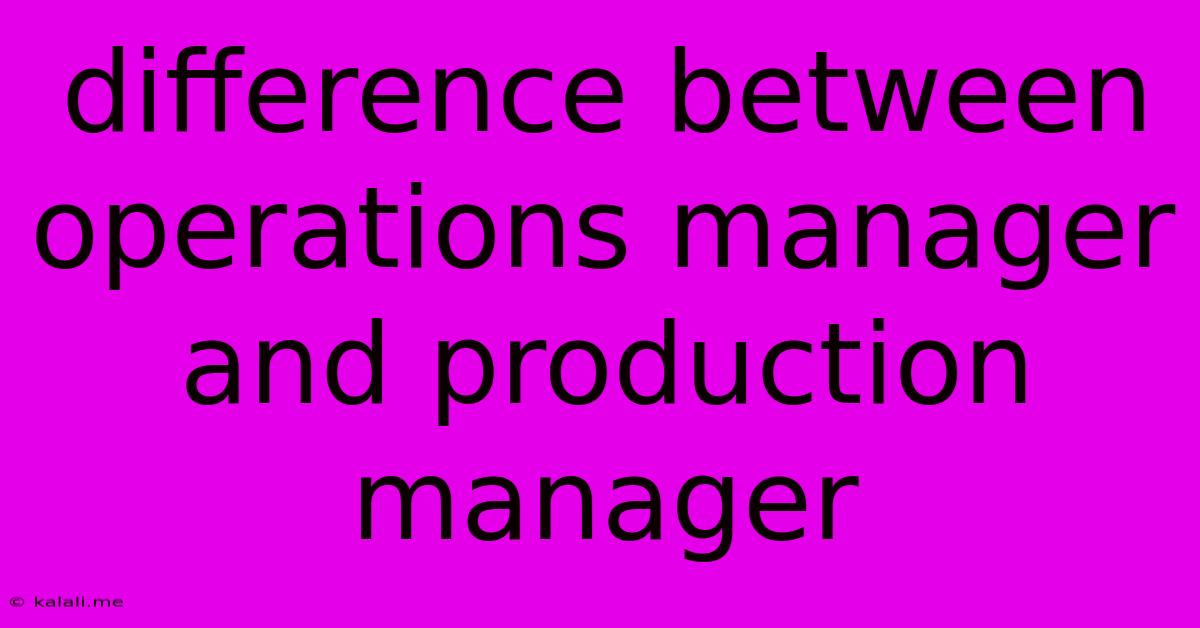Difference Between Operations Manager And Production Manager
Kalali
Jun 14, 2025 · 3 min read

Table of Contents
Operations Manager vs. Production Manager: Unveiling the Key Differences
Choosing between a career as an Operations Manager or a Production Manager can be confusing, as both roles involve overseeing crucial aspects of a business. While there's significant overlap, understanding the nuanced differences is critical for career progression and organizational success. This article will dissect the key distinctions between these two vital management positions. We'll explore their responsibilities, required skills, and career paths to help you gain a clearer perspective.
What is an Operations Manager?
An Operations Manager is responsible for the overall efficiency and effectiveness of an organization's day-to-day activities. They focus on streamlining processes, improving workflows, and optimizing resource allocation across various departments. Their purview is broader, encompassing a wider range of functions beyond just production. Think of them as the conductors of a large orchestra, ensuring every section plays its part harmoniously to achieve a common goal.
Key Responsibilities of an Operations Manager:
- Strategic Planning & Implementation: Developing and executing operational strategies aligned with the company's overall business goals. This involves setting key performance indicators (KPIs), budgeting, and resource allocation.
- Process Improvement: Identifying bottlenecks, inefficiencies, and areas for improvement within operational processes. They often utilize lean methodologies and Six Sigma principles for optimization.
- Team Management & Development: Leading and motivating operational teams, providing guidance, training, and performance management.
- Technology & System Management: Overseeing the implementation and maintenance of operational technologies, systems, and software. This might include ERP systems, CRM software, or specialized production management tools.
- Compliance & Risk Management: Ensuring adherence to relevant regulations, industry standards, and safety protocols. This includes identifying and mitigating potential operational risks.
- Supply Chain Management: Monitoring and optimizing the flow of goods and services, from procurement to delivery. This can involve vendor relationships, inventory control, and logistics.
What is a Production Manager?
A Production Manager, on the other hand, focuses specifically on the manufacturing or production process. Their primary concern is the efficient and effective production of goods or services, ensuring quality, meeting deadlines, and staying within budget. They are deeply involved in the nitty-gritty details of production.
Key Responsibilities of a Production Manager:
- Production Planning & Scheduling: Developing and implementing production schedules, allocating resources, and managing production workflows to meet customer demands.
- Quality Control: Implementing and maintaining quality control measures to ensure products meet specified standards. This often involves working closely with quality assurance teams.
- Inventory Management: Managing raw materials, work-in-progress, and finished goods inventory levels to optimize production efficiency and minimize waste.
- Equipment Maintenance & Upkeep: Overseeing the maintenance and repair of production equipment to minimize downtime and ensure optimal performance.
- Team Supervision: Managing production teams, ensuring adherence to safety regulations, and motivating employees to achieve production targets.
- Cost Control: Monitoring production costs and identifying opportunities for cost reduction without compromising quality or efficiency.
Key Differences Summarized:
| Feature | Operations Manager | Production Manager |
|---|---|---|
| Scope | Broader, encompassing all operational aspects | Narrower, focused solely on production |
| Focus | Efficiency, effectiveness, process improvement | Production output, quality, cost control |
| Responsibilities | Strategic planning, team leadership, system management | Production planning, quality control, cost management |
| Industry | Applicable across various industries | Primarily in manufacturing and production sectors |
Choosing the Right Path:
The ideal path depends on your interests and skillset. If you enjoy strategic planning, process optimization, and leading diverse teams, an Operations Manager role might be a better fit. If you are detail-oriented, passionate about manufacturing processes, and thrive in a hands-on environment, a Production Manager role could be more rewarding. Both roles offer significant growth potential and opportunities to make a substantial impact on an organization's success. Remember to carefully consider your strengths and career aspirations when making your decision.
Latest Posts
Latest Posts
-
Grasslands Of South America Are Called
Jun 15, 2025
-
Least Common Multiple Of 3 And 13
Jun 15, 2025
-
What Is The Factor Of 92
Jun 15, 2025
-
Gpa Requirements For University Of North Georgia
Jun 15, 2025
-
Polity Laxmikanth 7th Edition Pdf Free Download
Jun 15, 2025
Related Post
Thank you for visiting our website which covers about Difference Between Operations Manager And Production Manager . We hope the information provided has been useful to you. Feel free to contact us if you have any questions or need further assistance. See you next time and don't miss to bookmark.